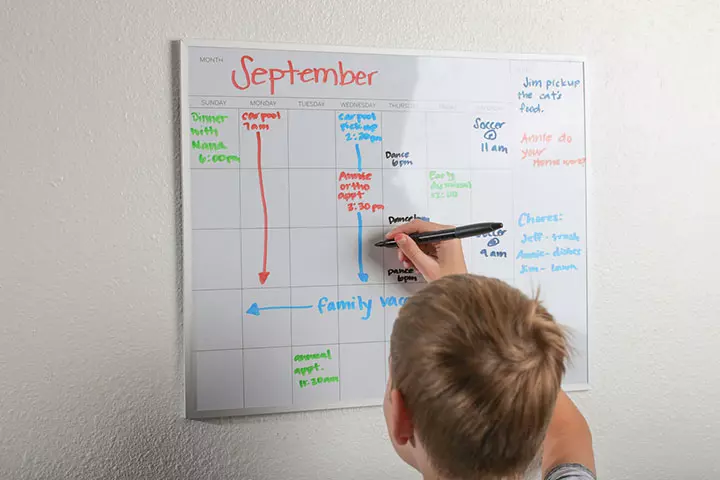
Image: Shutterstock
Rachel stood in the elevator looking down at her strong-willed toddler on the floor. He swung his head backward and let out another enormous WAAAAAAA, loud enough to grab the attention and sympathy of others who were in the elevator.
At that particular moment Rachel wanted to cry too, but as a parent, she decided to have self-control. She knelt down to her toddler, waited until their eyes locked and said a few calm but firm words. As the elevator reached their floor, she gave a confident smile to others present, picked up her son from the floor and walked out of the elevator.
If this sounds familiar to you, then there is a pretty good chance that your kid is a strong-willed child. Having a strong-willed child is not a curse; it’s a blessing. One just needs to know how to guide them. Luckily, we, the adults, have the developed cerebral cortexes our young ones lack, so dealing with them is not as difficult as it may seem.
We tell you who classifies as a strong-willed child, and how you can deal with him.
Key Pointers
- Strong-willed children have a desire to be in control of their lives.
- They are natural leaders among their peers and resist peer pressure.
- They are assertive and have a strong opinion on how things should be.
- When frustrated, they may exhibit extreme anger outbursts and refuse to perform tasks they don’t want to do.
- They prefer setting their own rules and moving at their own pace.
- Disciplining a strong-willed child requires focus, communication, and setting realistic and clear boundaries.
Who Is A Strong-Willed Child?
Strong-willed or spirited children are those who want to have a sense of control over their life.
They are self-assured, resilient, tenacious, and headstrong. They love to challenge rules and rebel if you dictate or give them an ultimatum. They may get angry if things are not done their way.
Strong-willed children also know what they want, and are not easily swayed by peer pressure. They tend to be the leaders in their peer groups. They need to test rules to know how strong and reliable they are. They demand to be respected, which may often make them come across as a manipulative child. They may have more difficulty regulating their emotions than children with a more compliant style.
Take the quiz at the bottom of this page to understand how strong-willed your child is.
So, how do you identify a strong-willed child? What characteristics do they have? Below we have mentioned some characteristics that most strong-willed children commonly have.
10 Most Common Characteristics Of A Strong Willed Child
Before you conclude anything about your child, check if he/ she has most of these characteristics:
1. They are assertive:
Strong willed children have a vision in their mind about how things should be and they often orchestrate ways to turn that idea into reality.
They are not shy about telling adults what to do.
2. They refuse to do things they do not want to do:
Strong willed children can be unyielding, meaning they will not be easily convinced or forced to do something that they do not want to do. You will need to be creative and attentive in learning what works for your child. You will also need to have clear rules and boundaries that are communicated well.
Tekia Lampkin, a mother of two, has observed a similar behavior in her little girl. She says, “One thing I noticed about my child is that she likes to do the opposite of what we suggest. No, not just likes. Enjoys. She would vastly prefer to go her own route instead of just heeding our advice (i).”
3. They have intense angry outbursts:
All toddlers throw tantrums but a strong willed child exhibits intense anger that does not subside easily. They often have a low tolerance for transitions or sudden changes. Their frustration or anger may be overwhelming and they will need your help learning to express their feelings in a socially appropriate manner.
4. They are impatient:

These kids hate waiting for anything, be it in a line at the grocery store, sitting in a waiting room at the dentist’s office or waiting for their turn when playing. They are extremely impatient and want things to be done quickly and as per their wish because a strong-willed child has a clear idea of how things “should” go, they often have a hard time waiting their turn. However, a wise parent will have on hand ways to engage the intelligence of their strong willed child and actively teach them the value of waiting. This may require some incentives, especially when they are younger.
5. They like to make their own rules:
Adults often struggle with children with a strong will, expecting the child to comply easily. Strong willed children will follow authority figures who “earn” their respect through kind consistency and firm boundaries. They do like to make their own rules, but they need appropriate limits just as much as any other child.
6. They ignore warnings:
It may seem that strong willed children are good at selective hearing and tune out what they don’t want to hear. Warnings or threats will not carry credibility with these children. The rules need to be stated in a clear manner, explained in a way that makes sense to the child and then enforced. Part of being a strong willed child is testing boundaries, so be ready to hold any rule/boundary you have established. And be willing to re-evaluate if the rule is reasonable for your child’s developmental stage.
7. They like to move at their own pace:
Just like any of us, spirited kids like to determine their own pace. If you are wanting them to move faster or slower, you will need to be aware of your child’s interests and creative in how to engage with them in a way that motivates them to work with you.
“Another of our current struggles is getting our dear daughter up and out of bed during the week. Most mornings are me beating my head against the brick wall of her snail-paced movements, my every sentence to her ending in ‘hurry up’. A majority of the time, she is just swallowing the last of her breakfast while being ushered into her shoes, jacket, backpack and out the door to the bus stop,” Lampkin adds.
8. They want what they want:
These children understand the difference between a need and a want. Whether they want to play out in the rain or eat doughnuts for breakfast, they are resolute about what they want and will ask or demand for it to happen. Parents who are firm and consistent, but kind, will be most effective in helping their child manage desires and disappointments.
According to Emily, a mother of four, strong-willed children often experience a burst of anger when their wants are not met, or things do not go as per their wish. She says, “They’ll be playing nice. Playing a fun game involves imagination and things like that. And I’ll hear Isaiah (son) saying, “okay, so now you’re going to do this this time this way” and so on and then I hear Lily (daughter) saying “no, I want to do this this and this.” So, this is when things will escalate with them because Isaiah is very like “you-must-do-it-my-way-or-I’m-going-to get-angry” type of person (ii).”
9. They demand to know why:
One of the good and bad things about strong willed kids is they want to know why they can’t do something or why you have set certain limits.
They question rules and decisions. It is difficult for them to do things just because you asked them to. It is important to meet this trait with patience and tolerance for their curiosity. However, it is also wise to set limits on the “whys”, such as establishing a rule that when asked to do something, they can ask “why?” after they have completed the task. Then be willing to give them a real answer.
10. They can argue forever:

These kids do not give up easily. They love to engage in power struggles and their persistence often works for them as they tire other people out. Try not to fall into the trap of engaging in a power struggle with them out of your own exhaustion. This can be a very important teaching moment for them to learn how to engage others in a respectful way while making their point or voicing their opinion.
By now it is pretty clear that a strong willed child is a challenge to parents. Therefore, you need to develop a wise parenting strategy for them.
Tips For Peacefully Parenting A Strong-Willed Child
Your strategy cannot be run-of-the-mill or defined by popular but unproven parenting tips. Observe your child, educate yourself, and customize your approach towards him/ her (1).
1. Respect and empathize with them:
Most strong-willed children are demanding respect. If you interact respectfully with them, they won’t need to fight to protect their position. And, like the rest of us, it helps a lot if they feel understood. Sometimes they just want to be heard and validated.
2. Listen to them:
As an adult, we might reasonably presume that we know best. But a strong-willed child has a viewpoint that is valid, and they are trying to protect what seems important to them. Only by listening to them and understanding their point will you know what’s making them oppose you. Listen to them with non-judgmental curiosity and acknowledgment of their feelings and desires. Empathy or compassion do not require agreement
 Point to consider
Point to consider3. Give your strong willed kid choices:
If you give him orders, he will almost certainly bristle, as would any of us. If you offer them a choice, they can exercise their will and learn from their choices. Only offer choices you can handle, and do not let yourself become resentful by handing away your power. This is a way to make them feel like they have some agency in their decisions.
4. Spirited children are experiential learners:
Unless you’re worried about some serious injuries or damages, let them learn through their experiences, with your oversight and guidance as needed. You can expect your spirited child to test limits often, as that’s how he learns. It’s easier to stay calm once you know that and to be on hand to soothe and redirect when things go awry.
5. Avoid power struggles:

You should set reasonable expectations and enforce them. But under no circumstances should you try to break your child’s will or force them to comply with your views. They have to do what you want, but they are also allowed to have opinions and approach about it. This is what effective parenting is all about. Resist any thoughts to “break their will” or tendencies you may have to force, threaten or coerce into compliance. Remember, respect is what is being tested and you are the role model. A child having their own opinion or desires does not have to devolve into a power struggle.
6. Mastery more than anything:
Encourage them to take charge of as many of their activities as possible.
Coach them into success. Don’t nag them to do anything; if they feel independent and in-charge of themselves, then they will have less need to oppose. Not to mention, strong-willed kids take responsibility early in life and are steadfast in their approach to achieving their goals.
7. Give them authority over their body:
If your spirited child does not want to wear a jacket then don’t force them. However, they do not realize that it is cold outside. In a situation like this, do not undermine that self confidence. Just tell them that they do not have to wear it now, but can carry the jacket and use it later if they change their mind. Teach them that there is nothing wrong in letting new information change their mind.
Strong willed or spirited kids are definitely a challenge but there are ways to face the daily battles and win them.
How To Deal With A Strong-Willed Toddler?
As a parent we all want a well-behaved and perfect child but no such thing actually exists. Keep some of these simple strategies in mind when dealing with your strong willed kid (2).
1. Tell your toddler what’s coming next:
Toddlers become apprehensive if they cannot predict what is coming subsequently but spirited toddlers need events spelled out to them in an extent that you may not expect. One cannot cut all the surprises out from your child’s life but you can minimize the stress by giving your toddler a head’s up whenever you can. This helps them manage their expectations as well.
2. Always be clear and consistent:
It is important to set limits for your toddlers because if you don’t then they will test you and demand what they want. Spirited toddlers need the security and consistency of clear rules.
3. Stay connected:
As toddlers move towards independence they still want to connect with you. They need to know that they can trust you to be there for them. This way they will ultimately be more independent.
4. Create a friendly environment:
The more child-friendly your house is, the less you will be fighting with your kid to keep him away from things or places. Organize your house in a way that your toddler has independence and involvement. Make sure his toys and books are easy to reach. For instance, a low cupboard in the kitchen area is safe for him to play.
5. If going out, choose places wisely:
Highly energetic tots cannot sit still at a place. Therefore, it’s sensible to choose restaurants carefully. Go for a picnic in a park where he has ample amount of space to run and play.
6. Reward good behavior:

Reinforce his efforts with positive feedback and messages. Praising him will encourage him to learn good behavior willingly.
7. Set realistic and developmentally appropriate expectations:
Toddlers need extra time to understand, learn and cope with things and changes which you may find easy and natural. Know where your child is developmentally and expect toddlers to handle things from their level not yours. Their emotional, physical, mental and psychological growth and development varies at different ages.
8. Use positive labels:
Use positive words when you are discussing your toddler with friends, relatives and teachers and soon they will come to see their great attributes too. When you focus on their positive traits and strengths, it changes your way of looking at things and your behavior and that in turn changes their behavior. A toddler who is stubborn, wild and a cry baby is also a child who is persistent, energetic, and sensitive, these are the qualities admired in adults.
 Experts say
Experts say9. Give time to run and play:
Toddlers love to keep moving. Let them get plenty of time to explore every day and play outdoors. Physical activity helps your toddler improve muscle control, balance and coordination. Mastering new skills will help your tot gain confidence.
10. Acknowledge feelings:
Empathize with your little one. Talk to her about why she does not like what is happening. Explain the problem or situation to her, just don’t get angry. Toddlers generally are not able to change their behavior in response to verbal reasoning. Eventually she will learn to recognize what winds her up before she goes over the edge.
11. Give attention:
Toddlers love attention and often we attend more to negative behaviors (for example, not listening) than to positive behaviors (adhering to expectations). Give time to your kid, show her how important she is, and how happy she makes you. If you see your child behave in a desired way, point it out to her.
You can allow your child to have a free will but that does not equate to indiscipline. Whether it is a strong willed child or otherwise, discipline is an integral part of the growing up years.
Tips To Discipline A Spirited Child
Discipline does not mean that you need to wield a stick at the kid. Talk to them, cajole them and if required be firm, but make sure the child is adhering to certain rules.
1. Discipline through the relationship, never through punishment:
Toddlers don’t learn when they’re in the middle of a fight. That’s when the adrenaline is pumping and learning completely shuts off. Instead of teaching during those emotional moments, take a deep breath and bond. The more you fight and punish your toddler, the more you undermine her desire to protect that warm connection with you. If she’s upset, help her express her anger, hurt, fear or disappointment, so they vanish. Then she’ll be ready to listen to you. But you have to model that, your toddler will not always do what you say but will always, eventually do what you do.
2. Ensure that your tone is warm, but firm:
A sharp tone can be over-stimulating and scary to a young child; this will push him to the fight-or-flight mode. Yelling will only aggravate things. Try not to scare them; they need to bond to stay emotionally regulated.
3. Always be consistent with consequences:
In order to maintain appropriate behaviors, toddlers must know that you will respond the same way under similar circumstances. Confidence in your decision is crucial. If you are not sure about your own decision then that is problematic. Remember toddlers like to gamble at their age, if it worked once, they will try it again. Staying consistent in your decision is more important than an unwavering rule.
4. Establish routines and adequate sleep:

Little ones greatly benefit from structure, and sleep is important to your tot’s physical and emotional health. If they don’t get sufficient sleep, then they tend to be cranky just like we get frustrated with our daily chores and work if we do not sleep well.
Strong-willed kids can be challenging, but there is a good side to this temperament. These little ones are not going to let the world change them, they will change the world and that is something to admire.
Positive Side Of A Spirited Child
Strong – willed children become adults who change the world as long as we can hang on for the ride and resist the temptation to tame the spirit out of them.
– Anonymous
Spirited children have the ability to think independently and to stand firm for what they believe, they do not let the world change them. Many adults who are successful are the people who didn’t give up to obstacles as kids. They see a challenge and meet it head on. Spirited children grow on to become determined and committed people who can make a real difference in the world. They are born leaders.
If you think you are the only parent dealing with a strong willed child, you might be wrong. Spirited children are so common in this society that there are several books on parenting such kids.
Books On Parenting Spirited Children
- Peaceful Parent, Happy Kids: How to stop yelling and start connecting — by Dr. Laura Markham.
The book focuses on the parent, helping them understand and control their emotions so that they can be better a parent. This book is specifically on toddlers through elementary school-aged children.
- Parenting the strong-willed child: the clinically proven five-week program for parents of two to six years olds — by Rex Forehand and Nicholas Long
This book will walk you through hands-on ways to deal with your strong-willed kids. The book also has a helpful section about how to work with your child’s teachers to make sure you’re giving a united discipline front.
- Kids are worth it!: Giving your child the gift of inner discipline — by Barbara Coloroso
We all want quick solutions to behavioral problems, but parenting is a long-drawn game. The book focuses on self discipline and how to help your child develop it.
- Raising your spirited child: A guide for parents whose child is more intense, sensitive, perceptive, persistent and energetic — by Mary Sheedy Kurcinka
This book is voted as one of the top 20 parenting books on Amazon. The book focuses on specific areas that tend to be high-conflict, like bedtime, mealtime, and homework.
- Setting limits for your strong-willed child: Eliminating conflict by establishing CLEAR, firm and respectful boundaries — by Robert J. Mackenzie
Think of this book as your parenting toolbox. Sometimes it feels like your only two options are punishment or permissiveness but Mackenzie gives you plenty of ways to handle the troubles that come along with having a strong-willed child so that you can encourage your child to behave.
 Point to consider
Point to considerYou need to be sincere in your efforts and follow the practices judiciously to deal with your kid. Before making any decisions, check where your child stands on the meter of strong-will.
Take This Quiz
Mark each of the following statements that are true most of the time.
My child:
- Never really accepts words like “impossible” or phrases like “it can’t be done”.
- Can move at the speed of light from being a warm, loving presence to being a cold child.
- Argues a point to an extreme level, sometimes just to see how far into the ground the point will go.
- When bored, has been known to create problems rather than have a day go by without incident.
- Considers rules and ultimatums to be more like guidelines (i.e., “As long as I’m abiding by the ‘spirit’ of the law, why are you being so picky?”).
- Shows great creativity, seems to always find a way to accomplish a goal.
- Can turn what seems to be the smallest issue into a raging controversy.
- Does not do things just because “you’re supposed to”. It needs to matter personally.
- Refuses to obey, seems to always have a few terms of negotiation before complying.
- Is not afraid to try the unknown to conquer the unfamiliar.
- Can take what was meant to be the simplest request and interpret it as an offensive ultimatum.
- May not actually apologize but almost always makes things right.
Score:
- 0-3 – Your child might have a strong will, but he doesn’t use it a lot.
- 4-7 – Your child uses his strong will when he needs to, but not on a daily basis.
- 8-10 – Your child has a very healthy dose of strong will, but can back off when he wants to.
- 11-12 – Your child is one strong-willed kid. He finds it almost impossible not to use it.
There may be times when you feel like you are teaching a brick wall. There may be times when you may feel like going backwards instead of forward. But there will also be moments when you will see glimpses of the greatness within your child, greatness that is still in the process of emerging from its cocoon. Just stay positive and enjoy parenthood.
Frequently Asked Questions
1. How to potty train a strong-willed toddler?
Whether it is a three-day method or potty training boot camp, make sure everyone who is involved in the process is on the same page, be it your spouse, baby sitter, nanny or mother. Strong willed toddler needs consistency.
Make it fun. Potty training becomes a boring chore after a few days of running back and forth. Be creative in finding ways to make potty training fun for your toddler. Get a potty training book or toy; give your toddler a special stash of goodies that are only allowed to be played with when they are on the potty.
Use positive reinforcement. Toddlers want to make their parents happy. Giving them positive reinforcement empowers them to know what the right decision is and how to make you happy and proud.
Most important thing when you potty train your strong-willed toddler is not to lose your temper. It is a difficult job to train your toddler but losing patience is not going to help you or your toddler.
2. How do we set limits for a strong-willed child?
Always think ahead, make a plan or strategy. Parents often know areas where their toddlers will push or fall apart. Take the space to think things through and know where your limits lie ahead of time.
Do not explain the reasons more than once. Repeated explanations will make you vulnerable.
Check your body language and facial expression. Nonverbal cues are important while communicating and always get down to their level or height. It is because you are huge and intimidating to a small child. You can mean what you say while crouched down in close proximity and wearing a neutral facial expression. Use humor often.
3. How to home-school a strong-willed child?
Find the different ways they can learn:
Most strong-willed kids are not print smart. If you make them sit down in front of a conventional text book curriculum then they are going to be frustrated. They learn better by hearing and doing. Understand your child’s learning styles and implement a strategy that fits your strong-willed child’s particular strengths. Doing this will help you minimize impatience and frustration. For example, when teaching your child, make them sit on the tip of a large exercise ball to let them keep moving while they learn. Movement especially in kinesthetic learning helps with memory.
Let your kid choose:
Strong-willed children want to get out there and lead. Let them, whenever it is possible. Let him choose what he wants to study or practice on a day. Letting your child take control, wherever possible, will help both of you make studying easier.
Use their interests to motivate them:
Homeschooling gives you freedom to create an atmosphere where learning can take place in different ways. Be creative, and take advantage of that. For example, if your child hates to write or read books but loves to play with a computer or iPad, then find an app to assist them.
4. Is it possible to change my strong-willed child’s behavior?
Since strong-willed children like to know the reason, clearly communicating and expressing your feelings and expectations to them, setting firm boundaries, and providing them with proper explanations and reasoning can help you manage your child’s behavior.
5. Are there any specific parenting styles that work best with a strong-willed child?
While parenting styles should differ and be modulated as per the child’s age and behavior, a democratic parenting style or an authoritative parenting style may work well for strong-willed children. The aforementioned styles provide free expression of thoughts and similar or equal authority as other family members in the house. Also, regardless of the parenting style, you should be approachable and flexible toward your child.
6. Can I use humor or distraction to diffuse a tense situation with my strong-willed child?
You may use humor to lighten the mood and relax the tense situation with your child but do not use it to dismiss or ignore the situation, especially with strong-willed children who like to reason. If the humor or other distraction is not done right or within the appropriate context, these children may negatively perceive this behavior as belittling their feelings.
A strong-willed child likes to make their own rules and is adamant about what they want. Thus, to control them, it is essential that you listen to them, respect what they say and avoid any power struggles as it might worsen the situation. It is also vital that you maintain your calm during such situations, create a friendly environment, and give your attention to help deal with them. We have also provided some tips that will help you discipline them, but not with the help of punishment.
Infographic: Quotes For Your Strong-Willed Child That You Can Relate
While you’re trying your best to give positive parenting and a safe environment for your strong-willed child to grow, there might be some days when you feel like you want to give up. But, at those times, be calm and courageous and know that your child will have a great future as they grow with such determination. Keep these quotes handy from the infographic below to encourage yourself in this journey of parenting a strong-willed child. Illustration: Momjunction Design Team
Illustration: Traits Of A Strong-Willed Child And Tips To Deal With Them

Image: Dall·E/MomJunction Design Team
Learn from experts how to parent your strong-willed child! Get 3 tips to help you manage their behavior and create a positive environment.
Personal Experience: Source
MomJunction articles include first-hand experiences to provide you with better insights through real-life narratives. Here are the sources of personal accounts referenced in this article.
i. The Concrete Rose;https://theconcreterose.medium.com/my-strong-willed-child-963e8868370cii. My Experience Raising a Strong Willed Child | Welcome to Motherhood Eps.1;
https://www.youtube.com/watch?v=0OsNPu9yxho
References
- Effective discipline for children.
https://www.ncbi.nlm.nih.gov/pmc/articles/PMC2719514/#:~:text=The%20following%20are%20some%20ways - The strong willed child: 5 ways to turn tension into joy.
https://childrensmd.org/browse-by-age-group/toddler-pre-school/the-strong-willed-child-5-ways-to-turn-tension-into-joy/
Community Experiences
Join the conversation and become a part of our nurturing community! Share your stories, experiences, and insights to connect with fellow parents.
Read full bio of Dr. Holly Schiff
Read full bio of Sagari Gongala
Read full bio of Rebecca Malachi
Read full bio of Apoorva K



















